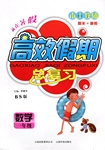题目内容
文中共有10处语言错误,请在有错误的地方增加、删除或修改某个单词。每处错误及其修改均仅限一词;只允许修改10处,多者(从11处起)不计分。
I visited my aunt in a countryside near the city last week. I was surprised to see that great changes had been taken place in the countryside. Take my aunt's family for example. They supply preciously trees and flowers to the stores in the cities and have over ten workers working for themselves. Their family's income reached as much 100,000 yuan last year. Not only did they have a house, a car and computers, they can also afford a trip abroad every year. When asking what else they needed most, they said that they wanted to learn a few English so that they could do business with foreigners directly. To their delighted, my cousin can use he has learned from university to help them with overseas trade.
 暑假作业海燕出版社系列答案
暑假作业海燕出版社系列答案 本土教辅赢在暑假高效假期总复习云南科技出版社系列答案
本土教辅赢在暑假高效假期总复习云南科技出版社系列答案
